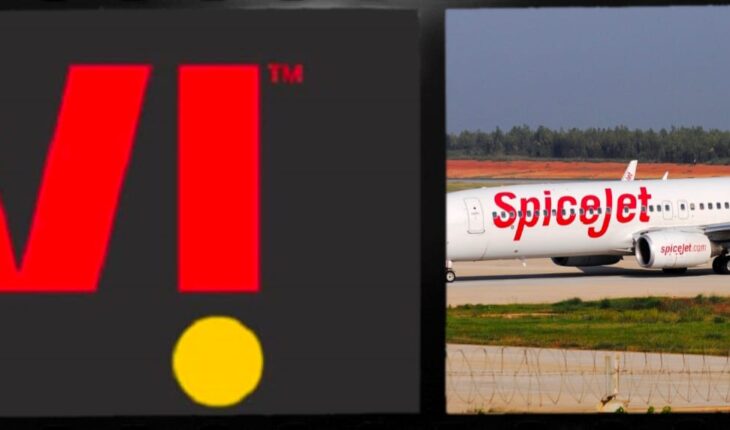India’s telecom and aviation sectors face critical challenges. Vodafone Idea must manage its mounting debt while staying competitive, and SpiceJet’s survival hinges on financial restructuring and operational stability.

India’s telecom and civil aviation sectors, once celebrated for their rapid expansion and potential, are now grappling with significant financial challenges. Two of the most notable examples of this downturn are Vodafone Idea, a debt-ridden telecom provider, and SpiceJet, an airline struggling to stay afloat. These companies mirror the broader struggles of their respective industries, where mounting debts, regulatory hurdles, and operational inefficiencies threaten their future.
Vodafone Idea (VIL), once a leading telecom player in India, now finds itself in a precarious financial position. The company, born from the merger of Vodafone India and Idea Cellular in 2018, has been drowning in debt, with a liability that exceeds Rs 2.2 lakh crore. VIL’s troubles can be traced to a combination of factors: the fierce price wars initiated by the entry of Reliance Jio, regulatory issues like the Adjusted Gross Revenue (AGR) dues, and a lack of substantial capital infusion. The government’s recent attempts to ease the sector’s financial burden, such as the moratorium on spectrum payments, have provided temporary relief, but VIL’s future remains uncertain.
In the first quarter of FY24, VIL reported a consolidated net loss of Rs 7,840 crore, indicating the continuing financial strain. While the company has managed to sustain its subscriber base, it has struggled to raise capital, and its ability to invest in much-needed 5G infrastructure remains in doubt. The Indian telecom sector is on the cusp of a significant shift, with 5G services expected to drive the next growth phase. However, VIL’s financial woes could result in it falling further behind rivals like Reliance Jio and Bharti Airtel, which are aggressively expanding their 5G networks.
In parallel to VIL’s struggles, the civil aviation sector, particularly low-cost carriers like SpiceJet, faces severe headwinds. SpiceJet, once India’s second-largest airline by market share, has seen its fortunes dwindle. With losses mounting and operational challenges growing, the airline has been fighting to stay airborne. Recent data shows SpiceJet has a fleet size far below its previous peak, with only about half its aircraft currently in operation.
SpiceJet’s financial troubles can be attributed to multiple factors: rising fuel costs, competition from other low-cost carriers, the grounding of its Boeing 737 MAX aircraft, and the lingering effects of the COVID-19 pandemic. The airline reported a net loss of Rs 789 crore in the June quarter of FY24, its highest in recent years. Additionally, its debt burden continues to grow, with unpaid dues to lessors, fuel suppliers, and airports creating further operational difficulties.
Despite these challenges, SpiceJet remains hopeful, with plans to raise funds through external investments and the potential sale of a stake in its cargo business, SpiceXpress. However, the airline’s future remains uncertain, and if it can restructure its finances and improve operational efficiency, it may face the same fate as Jet Airways, which was grounded in 2019.
The struggles of Voda-Idea and SpiceJet are not isolated cases but indicative of broader issues plaguing India’s telecom and aviation sectors. Both industries have been hit by external factors such as global economic uncertainty, rising fuel and operational costs, and domestic regulatory pressures. For the telecom sector, the AGR dues, amounting to over Rs1.6 lakh crore, have added a significant financial burden to companies already operating on thin margins. On the other hand, the civil aviation industry continues to face high fuel taxes, making it difficult for carriers to operate profitably.
India’s telecom sector is dominated by a few players, with Reliance Jio leading the pack. Jio’s aggressive pricing strategy has forced competitors like Vodafone Idea and Bharti Airtel to slash tariffs, significantly declining average revenue per user (ARPU). While beneficial to consumers, this price war has eroded the telecom companies’ profitability, leaving them with massive debts and limited room for investment in new technologies.
Similarly, the civil aviation sector is witnessing consolidation, with market leaders like Indigo capitalizing on the struggles of weaker players. SpiceJet is fighting for survival in an environment where competition is fierce and operational costs are soaring. With airlines facing additional pressures from environmental regulations and the rising demand for sustainable aviation practices, the road ahead appears difficult.
Both the telecom and civil aviation sectors in India are at critical junctures. Vodafone Idea’s challenge is overcoming its mounting debt while ensuring it does not lose further ground to its competitors. SpiceJet’s survival depends on restructuring its financial obligations and regaining operational stability. As these two companies navigate their respective challenges, the broader industries they represent will watch closely as their fortunes intertwine with the future of Indian telecom and civil aviation.
The writer is a senior journalist and columnist,.Views are personal.
Twitter @narvijayyadav






